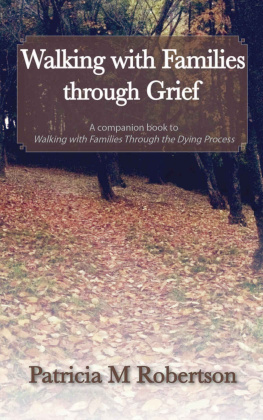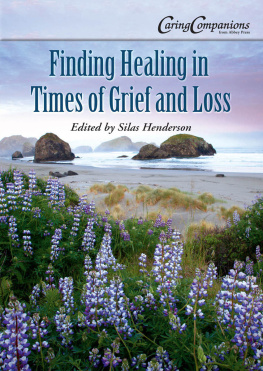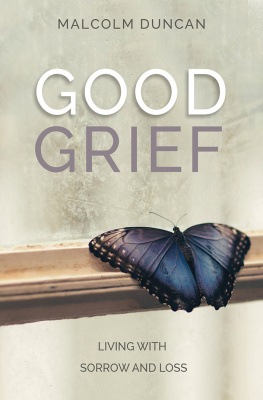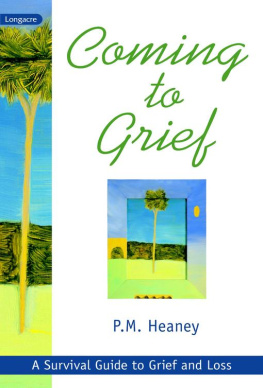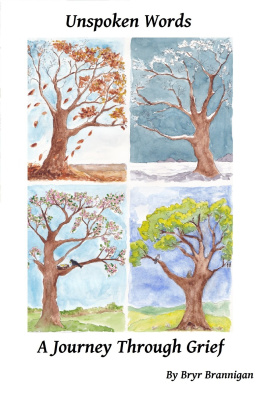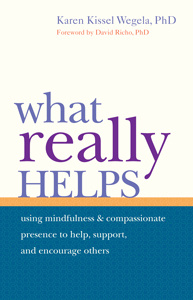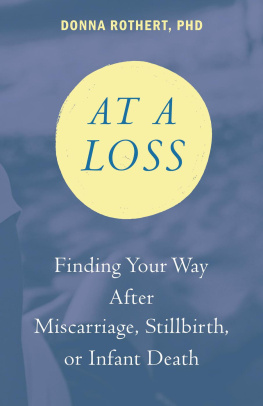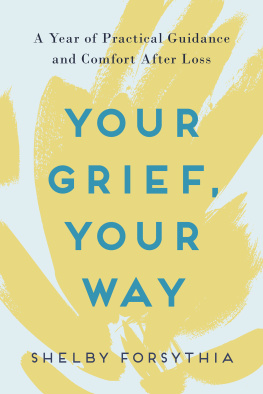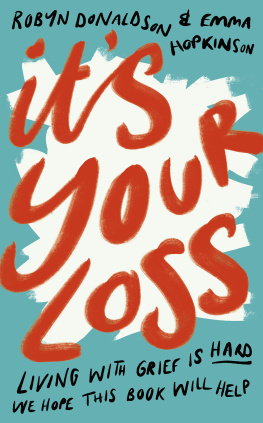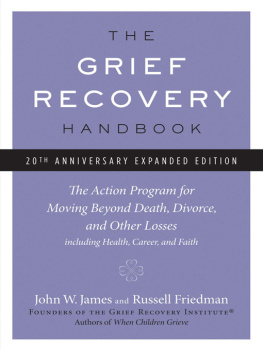Walking with Families through Grief
Patricia M. Robertson
2017 Patricia M. Robertson
2525 Cobb Road
Jackson, MI 49203
ISBN: 978-1543269932
All Rights Reserved
Cover by BethanyLynn Designs
https://patriciamrobertson.com
Contents
Faces of Grief
Accept the Reality
Process the Pain
Adjust to Life without your Loved One
- Find an Enduring Connection with the Deceased
Families and Grief
Children and Grief
The Elderly and Grief
Other Losses
General Principles to Help Families
Conclusion The Promise of a New Day
Int roduction
She was the first friend I made after the move from the big city, Flint, Michigan, to the village of Concord, Michigan; the first close female friend I had had for a while. Amidst the daily responsibilities of being a wife, having babies and pastoring a church, I had little time to maintain old friendships, much less establish new ones. As such, Sally had been a gift to me. We clicked immediately in a way I hadnt since my college roommate. It was a situation of having a need fulfilled I hadnt even recognized I had until out of the blue it was filled. Only she had a slow-growing brain tumor that eventually took her life.
At thirty-five, I had never had anyone I was close to die. I had visited a number of church members who had died, but none of them affected me like Sallys death. Though I visited other church members every other week, I found it much harder to visit Sally. It was just too hard, and besides, Sally was my friend. As a friend, she understood if I didnt visit more often, I told myself. And she did. There was never any recrimination or suggestion that I was not visiting enough. She appreciated when I visited, even if only once a month.
At one time she had told me about the experience of being in the hospital after brain surgery, in post-op, and being in excruciating pain. Each time, just as the pain became more than she could handle, she felt herself being lifted up by loving arms, the pain subsiding and a peace she could not explain spreading throughout her body. Then she was placed back on the table until the pain grew unbearable once again.
As she grew weaker, I remembered this story and would envision her being held by loving arms. This image gave me comfort whenever I worried about her over the course of her illness.
I was present when she died. She had been staying with her parents since her daily care had become too much for her husband who also had the care of their two children. She was breathing quietly as I prayed by her side. In another room, I could hear someone crying, saying how they couldnt bear to see her this way. In my mind I saw her once again being held in loving arms, in Jesus embrace. As I prayed, Jesus stood up with Sally in his arms and began to walk away, as Sally took her last breath. I didnt know what to think or do at this point. It appeared that Sally had been waiting for me before she died her final gift to me. I realized that her family should be notified and I called them in.
I went away feeling confused and unsure. I had never been at the side of anyone who had died before. Had she actually died, or had I imagined it? Maybe she started breathing again when I left. It was only after I received the call confirming what had happened that I began to slowly accept what I couldnt accept, that she was gone.
It has been over twenty five years since this happened but it remains vivid in my memory. Her death was followed by a wide range of emotion as I grieved her loss. It was an emotional roller coaster: In one minute I would feel joyful, remembering that experience at her death, and the next I would be crying as I tried to make sense of it. There were feelings of abandonment and jealousy because Jesus had taken her and left me. Sweets that I loved, no longer had an appeal to me. I lost around fifteen pounds in the months after her death. Over time, though, I adjusted and went on with my life without my friend, reminding myself that I would see her again someday; when that happened, it would be as if we had never been apart.
Sallys death had hit me hard because she was my age and also because she had been filling an important need in my life, the need for a female friend. The course of grief was hard. In contrast, the grief I experienced after my dads death was much easier. He had lived a good life and had not experienced an untimely death. His death didnt go against nature parents are supposed to die before their children. I still miss him, but it wasnt the gut-wrenching loss that Sallys death was.
Another major loss in my life was the death of my first marriage in divorce. This was complicated by years of wondering, would we maybe get back together? Divorce is a death, but there is no dead body to tell you it is over, just a piece of paper. I cried my share of tears over this ending, as well as spent time in counseling in order to come to some resolution and acceptance of the situation.
And most recently was the loss of employment when my position as chaplain at a retirement community was eliminated, followed a year later by the end of my position as Director of Family Ministry at my church, two very different situations eliciting different forms of grief.
In the first, I was taken by surprise when in the space of one hour I went from being gainfully employed to sitting in my car with the contents of my office packed into the trunk and back seat. No time to say goodbye to people I had grown to love over the previous twelve years, no time to prepare. I was left in a state of shock, which gave way to anger and took me more than a year to overcome.
In the second situation, I knew well in advance and was not surprised when given notice that my position was being eliminated. I was given ample time to prepare, tie up loose ends and say goodbye, and it was handled in a manner where I was able to maintain relationships I had at the church, including the one with my pastor, the bearer of the bad news. Two similar situations yet two very different outcomes.
A Lifetime of Loss and Transition
All of life is change. Some are more pleasant than others; some we look forward to, others we dread. But change happens whether we embrace it or not. It is unavoidable.
Jane had longed for this baby, anticipated its birth for months and was ecstatic that she had arrived into the world with all of the necessary body parts, a healthy baby girl. So why was she so teary-eyed and sad? It wasnt just post-partum depression, or the natural exhaustion from the physical demands of labor and delivery. Much as they had wanted the baby, with every change comes a loss. They had yet to allow themselves to grieve over what they had lost the freedom to come and go as they please, freedom from the constant demands of caring for a newborn, freedom to focus on themselves. In their joy over their daughters birth, they were not acknowledging the loss.
With every change we gain and we lose. For those changes we look forward to, graduation from high school or college, marriage, the birth of a baby, a new job, we have a tendency to focus on what we have gained without acknowledging our loss and the grief associated with that loss. Each of these are mini-deaths. For those changes we dread death of a loved one, the loss of a limb or health, loss of employment, loss of a relationship we have a tendency to focus only on the loss, the negatives, without acknowledging that hope remains, hope for a new life out of the death of the old.
While we may experience many losses in life, this book will focus on losses due to the death of a loved one, with some mention of other situations. We will explore normal grief versus complicated grief. We will enter into the world of the grieving in order to understand our own reactions and our loved ones reactions and thereby walk more readily alongside those who are grieving, allowing them the space that they need at times as well as offering support when needed.
Next page
